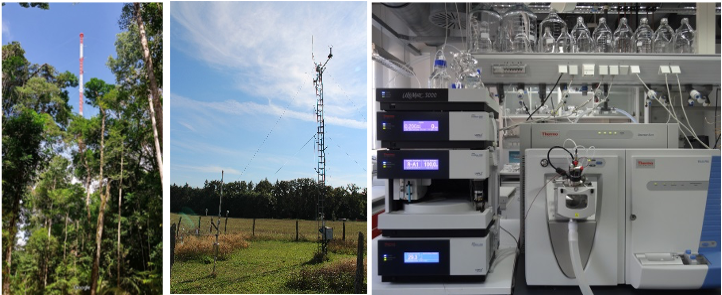PhD project offered by the IMPRS-gBGC in July 2025
Molecular Fingerprints of Ecosystems as Early Warning Systems for Climate-Induced Changes |
|
Markus Lange,
Valerie Schwab,
Georg Pohnert,
Gerd Gleixner
|
Project descriptionDissolved organic matter (DOM) is a critical component of the global carbon cycle, offering insights into ecosystem processes and health. Comprising a mixture of plant, microbial, and soil-derived compounds, DOM facilitates the assessment of plant-microbial interactions. This project aims to investigate how changing environmental parameters, such as precipitation, temperature, and extreme climate events, influence the molecular composition of DOM and how these changes can serve as early warning systems for ecosystem alterations.The research will focus on the vulnerability of ecosystems to environmental changes, considering their vegetation and soil properties. It will utilize DOM samples from diverse ecosystems in Germany and tropical regions in Brazil. Advanced analytical techniques, such as ultrahigh resolution mass spectrometry, will be employed to characterize DOM at the molecular level. The comprehensive DOM data will be related to weather and climate data using advanced statistical techniques. This research will enhance the understanding of how climate extremes and environmental changes impact ecosystem health and stability. By identifying molecular changes in DOM, the project aims to deepen the understanding of altered plant-soil interactions and develop a sensitive early warning system for detecting ecosystem changes, contributing to climate adaptation strategies. Working groupMolecular Biogeochemistry at the Max Planck Institute for BiogeochemistryRequirementsApplications to the IMPRS-gBGC are open to highly motivated and qualified students from all countries. Prerequisites for this PhD project are:
Related LiteratureLange, M. et al. Plant diversity enhances production and downward transport of biodegradable dissolved organic matter. Journal of Ecology 109, 1284-1297 (2021). https://doi.org/https://doi.org/10.1111/1365-2745.13556Roth, V. N. et al. Persistence of dissolved organic matter explained by molecular changes during its passage through soil. Nature Geoscience 12, 755-+ (2019). https://doi.org/10.1038/s41561-019-0417-4 Schroeter, S. A. et al. Hydroclimatic extremes threaten groundwater quality and stability. Nature Communications 16, 720 (2025). https://doi.org/10.1038/s41467-025-55890-2  left: View of the central 325m tower at the Amazon Tall Tower Observatory (ATTO) in central Amazonia; middle: Weather station at one of our study sites in Germany (Brandenburg); right: Front view of an LC-Orbitrap MS system in the Gleixner lab |